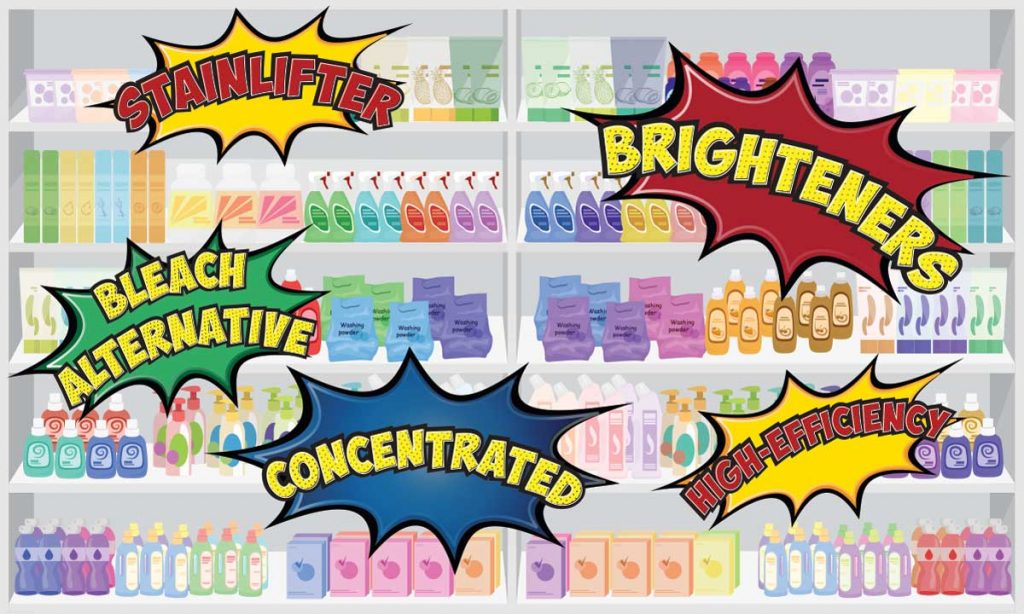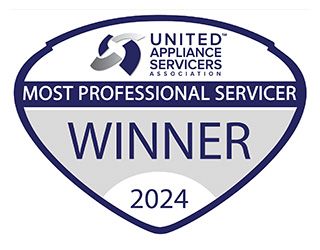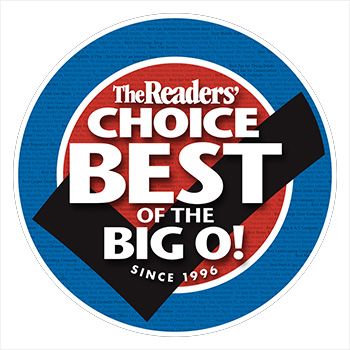Ever wonder what the best laundry detergent is for your washer?

How many different laundry detergents are out there? Your guess is as good as ours. 1,000? 10,000?!? Each seemingly more different than the last…
What is clear is that choosing the best laundry detergent for your needs is a pain.
Never fear! Hometown Hero Appliance Repair is here to save the day! Finding the right laundry detergent will save you money and time, while protecting both your clothes and your washing machine, so to help you choose, we’re going to walk you through the various types of detergents you’ll find and the marketing language they use.
Powder vs. Liquid vs. Pods: Which is Best?
Luckily, all three have nearly the same cleaning power. Liquid detergents may be just slightly better than their counterparts when it comes to cleaning, but powder detergents have been known to treat certain stains—such as blood and ground-in dirt—better. Pods come in third. The difference is barely noticeable in most cases though, so when choosing among these varieties, you’re really deciding among the following qualities:
| Powder | Liquid | Pods | |
| Shelf Life | Longer than a year | 6 months – a year | Longer than a year |
| Likelihood of Leaving Stain or Residue | Doesn’t always fully dissolve in cold water, leaving residue | Have been known to leave discolored stains | Have been known to leave discolored stains, don’t always dissolve completely |
| Likelihood of Oversudsing | Moderate, though easily avoidable | High, can cause mold and mildew buildup if overused | Low (engineered to be a good amount of detergent) |
| Misc. | If you get your box wet, you’re gonna have a bad time | Great for pre-treating stains | Though handy, kids have been known to eat these and they are SUPER toxic |
| Use If… | You buy in bulk or don’t go through detergent all that quickly. | You want the best clean and are willing to be careful when measuring dose. | You don’t have kids and carry-out your laundry to a launromat |
“Wait,” you say, “What’s wrong with too many suds? Doesn’t that just clean the clothes more?” Not according to the Samurai Appliance Repair Man: “most of people think, “Oooo, sudsy, that’s good!” No, not good. Suds do nothing to clean your clothes and are actually an undesirable by-product of the detergent’s chemical interaction with the water.” So, if you take anything away from this blog, remember:
Tip 1: Use only 1-2 tablespoons of detergent per cycle. Your clothes will emerge cleaner and last longer, as will your washing machine.
Natural v. Synthetic Detergents: Which is better?
As concerns about damage to personal health and to the environment grow, it’s become more common to see natural and organic laundry detergents. These concerns are important, but don’t believe the hype about “natural” laundry detergents: they aren’t helping anything. Here’s a laundry list of their problems:
- Many natural and DIY detergents rely on creating high pH (alkaline) slurries—using ingredients like lye—to “clean” clothes. Essentially, your clothes are “corroded clean.” Although the washer will work to remove most of these chemicals before the end of the cycle, how confident are you that they’re all gone? DIY detergents are especially toxic and should be steered clear of.
- These detergents are also corrosive to the machine’s internal parts, such as drum support spiders and bearing seals, and can wreck them over time. Gunk from these detergents can also build up, affecting water sensors, hoses, and generally causing the washer to underperform.
- And where do you think those chemicals end up after your washer drains? If you answered sewage and wastewater treatment plants, you’re correct! The vast majority of these chemicals do not enter the environment, which goes for engineered detergents as well. And the principal ingredients of all detergents, even synthetic ones, are biodegradable, so rest assured.
- Despite the claims, the non-partisan American Cleaning Institute states that natural ingredients must also undergo some degree of processing to be useful, and in some cases produce even more waste as a byproduct of production. Thus, no detergent is 100% natural or 100% free of environmental consequences.
Most damning, natural cleaners aren’t even that good at cleaning. There’s a reason laundry detergent is among the most engineered products in your home: cleaning clothes is hard.
HE (High-Efficiency) Detergent vs. Original
If you don’t know, high-efficiency doesn’t refer to the efficiency of the detergent, but the washing machine. Because HE washing machines use significantly less water, detergent engineers had to go back to the drawing board to make their products actually work in the new appliances. Thus, if you own a HE washer, you absolutely MUST use HE detergent; otherwise your machine will develop a nasty smell from built-up residue and suds may start popping out of the cracks.
And if you don’t own a HE washer? You should probably still buy HE detergent. It’s in our nature to want to clean things really well, so many of us have a tendency to use too much detergent, thinking more detergent = cleaner clothes. Truth is, more detergent means icky films and residue on your clothes and in the nooks and crannies of your machine.
Over time, this ruins clothes and significantly impacts the performance of your washing machine, resulting in less and less clean clothes with each cycle. In addition to causing problems with pumps through cavitation, excessive suds can induce other problems, such as clogging pressure sensing tubes with detergent residue (dried suds), which causes the washer to think the water level is too low. This, in turn, can cause the control to throw low water fill error codes or overfilling. (If any of this is ringing a bell, give us a call.)
Sticking with a HE detergent ensures you stop shooting yourself in the foot.
“What Other Additives Should I Look For?”
Your detergent and machine are engineered to not need additives in most cases, but let’s look at some of the usual suspects:
Q. Fabric softeners?
A. Avoid. These softeners stick to fabrics and build up in the moving parts of your washer. And all they’re doing is breaking down the fibers of your clothes to soften them, reducing the life of your clothes.
If your clothes are coming out stiff and hard, it may be that you have hard water (you can use this to test your water, or, neat trick, ask a store that sells tropical fish to test the hardness of your water). Most detergents already include water softeners to increase the effectiveness of the detergent, but you may want to look for a brand that promises to make a bigger impact on the hardness of your water.
Q. Optical brighteners?
A. May not be as dangerous as some claim, but surely unnecessary. Some natural brands claim optical brighteners are bad for both people and the environment. The science on the subject though is very slim, and many of the claims you’ll see are clearly overblown. Regardless, you may want to avoid them just to be safe, because they really are unnecessary.
Q. Bleach alternatives?
A. Ignore. Just a marketing gimmick that means enough non-bleach additives have been added to make clothes look bright.
Q. Stain-lifter, Stain-fighters, “Lift-and-lock,” etc.?
A. Ignore. Just another marketing gimmick. Every detergent that isn’t soap or lye-based is engineered to be a stain-lifter; it’s the very essence of how they clean. Bi-polar molecules called surfactants attach to stains, grease, dirt and whatever else is on your clothes (via their hydrophobic end) and then are lifted away from your clothes by the tumbling water (via their hydrophilic end). If you are prone to stains, get something to pre-treat stains before putting your clothes in the wash.
Wrap-Up
We asked our own Todd Daganar, President of Hometown Hero Appliance Repair, for his recommended detergent:
“I always say ‘If It Ain’t HE, It Ain’t For Me.’ Choose an HE-labeled detergent, and use 1 tablespoon for a typical load. I prefer one of the no-dye, no-perfume varieties such as All Free and Clear or Tide Free and Gentle to avoid any unnecessary irritants. Most important is not to overuse it, above all else.
If you aren’t sure whether you’re using too much detergent, there’s a simple test you can perform. Run the washer on empty – no clothes or detergent. If suds appear, you’ve been overusing.”
If you feel you’re a habitual over-sudser, or have noticed your washing machines isn’t working as well as it once did, give us a call. We provide washing machine maintenance and cleaning for all major appliance and luxury appliance brands, helping prevent costly breakdowns and return to you the joy of fresh, clean clothes.











